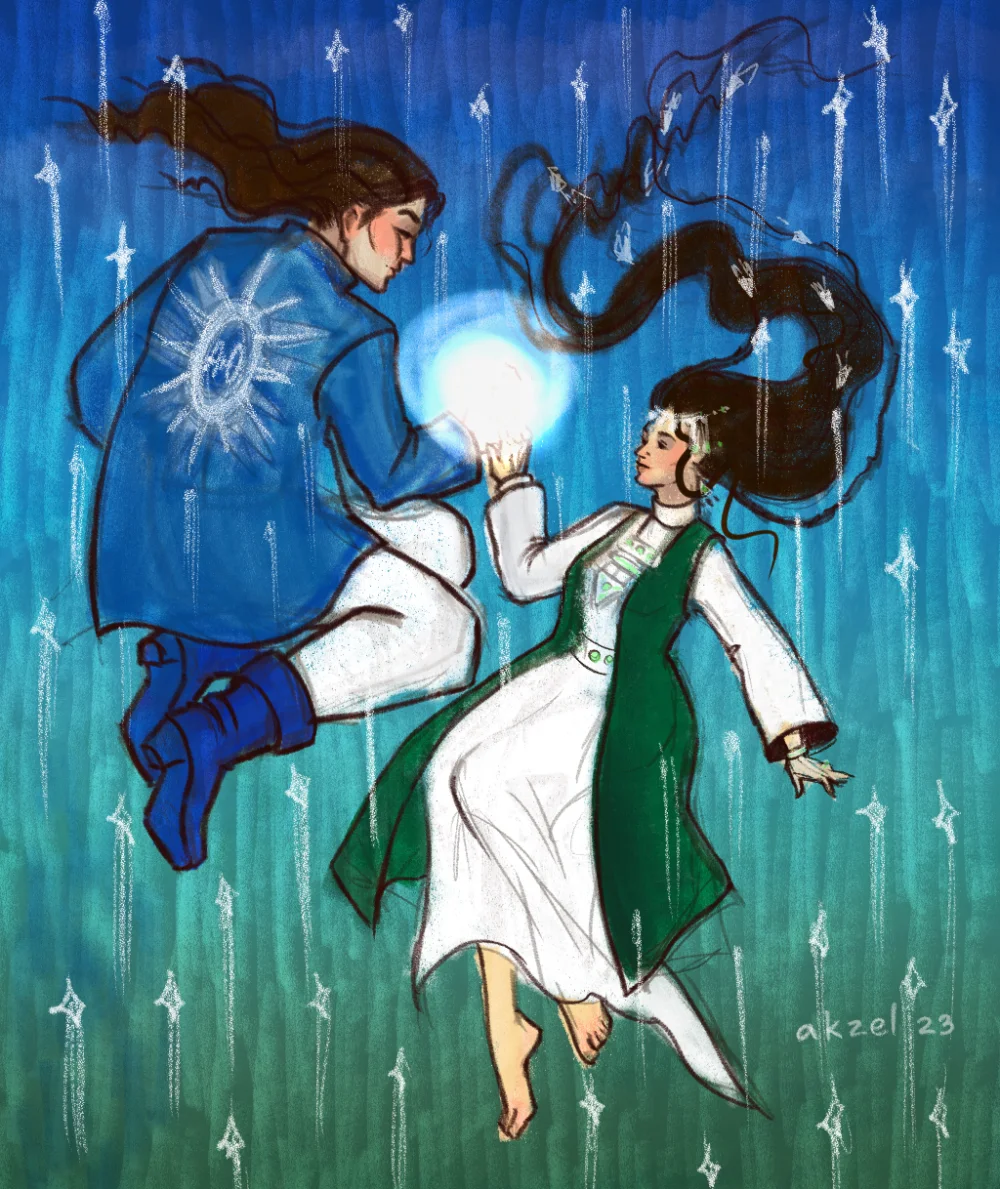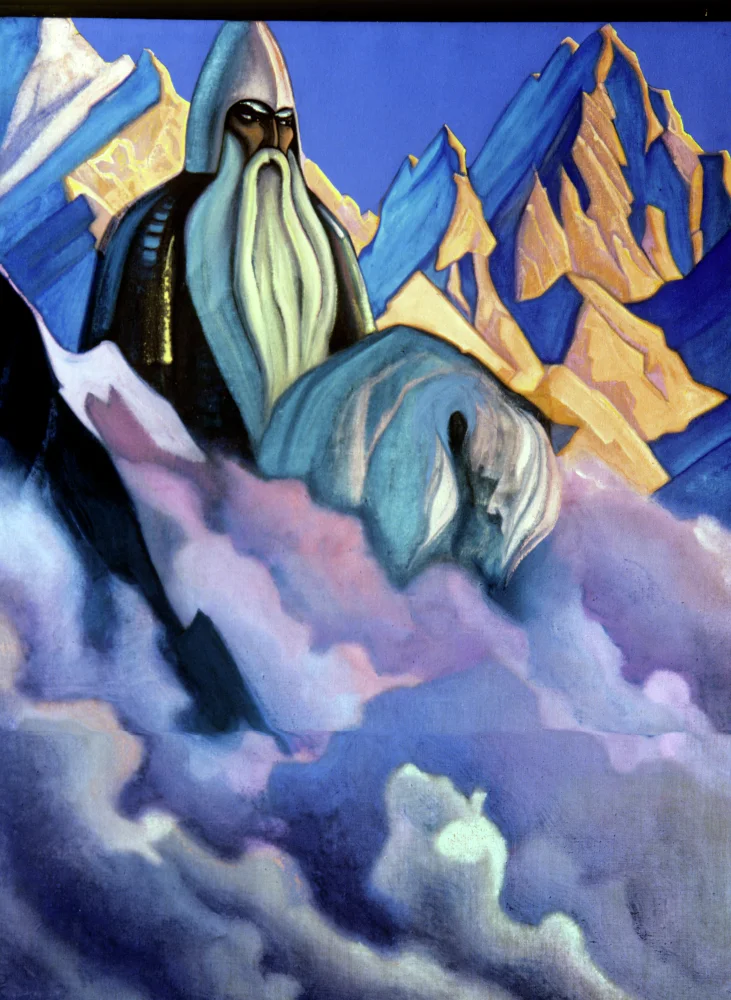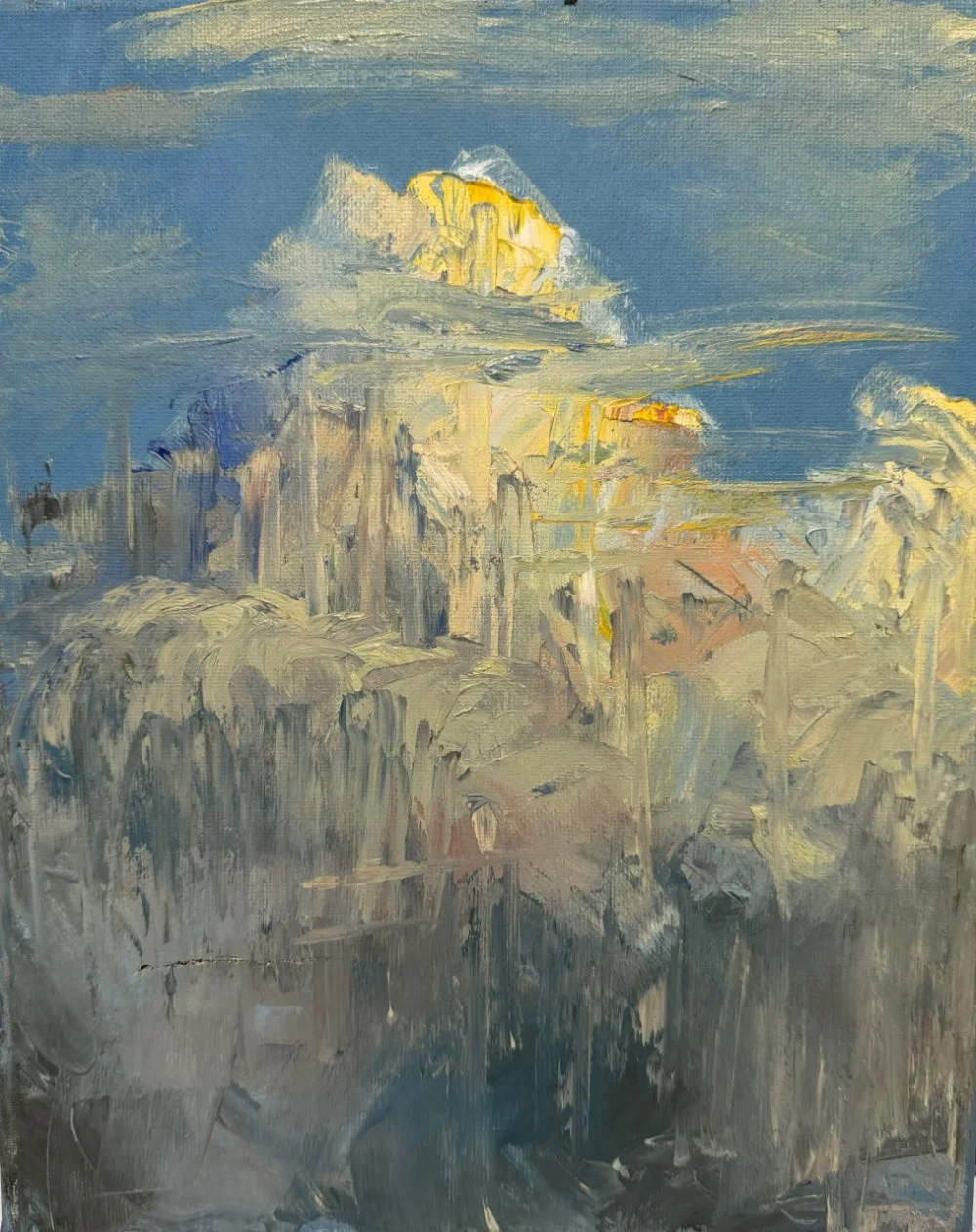The Most Mysterious Color
Kök: A Word That Only a Kazakh Will Understand

N.K. Roerich. The Sentinel «Ice Sphinx». 1938/International Center of the Roerichs
Did you know that Kazakh has a word that has such a multitude of meanings that it might surprise even the most seasoned linguists? And did you also know that understanding all these meanings opens the door to the roots of Kazakh ethnogenesis and the Turkic world?
This word has meanings connected to the most sacred categories of the Kazakh perception of the world, and at the same time, it also conveys the most practical, down-to-earth things.
This word is kök. The word is like a magnificent mountain, its summit revealing majestic views after a long climb up. Actually, it is even more grand—this word is the sky itself. In Kazakh, kök doesn’t only mean the color of the sky but also the sky itself in its most transcendental, heavenly, godly sense.

Khan Tengri Peak. Kazakhstan/Alamy
Kök Tengri: The Heavenly God
Zira Nauryzbai, a renowned researcher of Kazakh mythology, writes: ‘The word “kui”, which means a short instrumental piece performed on a two-string dombra or a string kobyz, has its etymological roots in the word “kök”, meaning “sky, heaven, highest and godly”.’ The Kazakh considered the kui to be ‘the whispers of Tengri’ and honored the kuishi, the musicians able to hear those whispers and bring them to ordinary people.
The heavenly meaning of this word emerged during the times of the Western Turkic khaganate, the borders of which, at the height of its power in the early Middle Ages, stretched from the Yellow to the Black Sea.
Quite symbolically, the creators of this empire, the ancestors of a number of peoples in Central Asia, including the Kazakhs, called themselves ‘Kök Turks’, meaning ‘heavenly Turks’.
‘We remember the most widely used epithet of Tengri, “Kök Monke Tengri or Eternal Blue Sky”,’ writes Almaty researcher Alexey Nikonov in his book Tengriism: The Dawn of Spirituality of Mankind. In his speech at the Turkic Seminar, he also adds: ‘The other name Turks use for the highest deity is “Kök Tengri”, which translates as “Heavenly God”. This name is mentioned in ancient Turkic inscriptions.’
Weighing in on the conversation, Kenje Torlanbayeva, a professor of Asian Studies, has similar views:
‘The word “Tengri” is very ancient and at first, it used to mean “the sky” but later, the meaning changed to “God” as “the heavenly spirit”. It was not a coincidence that our ancestors called it “Kök Tengri”, which means “Heavenly God”.’

Kazakh eagle hunter. Mongolia, Bayan-Olgii province, Altai mountains/Getty Images
The influence of this word is profound in Kazakh culture. Take, for example, the name of a high mountain area near Almaty, Kök Jailau. On the one hand, this name is translated as ‘the green pastures of Jailau’ and on the other, it means ‘heavenly and blessed pastures’. This is not a coincidence. The well-known Kazakh archeologist Alexander Goriachev announced the discovery of the remains of ancient masonry work in this area (at about 1,450–1,740 meters above sea level). This indicates that there was an ancient sanctuary here between the Bronze and the Iron age. This location was likely considered especially holy, imbued with a sacred significance by the heavens.
This ‘semantic nest’, filled with godly and sacred meanings, gave rise to the following expressions:
Kökke bağu: To ask of the heavens
Kökten sūrağany jerden tabyldy: What one asked of the heavens was found on Earth
Kök qasqa aitu: Make a sacrifice (to the heavens/God; slaughter a horse)
Kökke qūlash ūru: To aim for the sublime
The understanding of this word as ‘heavenly power’ stems from the age of Tengriism and is reflected in rather coarse idioms, such as:
Kök atsyn!: May the heavens strike (one) down!
Kök kärine ūshyra!: May the heavens strike you!
Kök soqqyr!: O, the victim of heaven’s punishment!

Beisembay Akzel. Jer Aspan - Earth and Sky. 2023 /Qalam
The Influence of Color on One’s Perception of the World
Using just one word, kök, to describe colors such as blue, light blue, green, and gray, as well as the spectrum of shades from azure to blue gray, is known as ‘Turkic color blindness’. This is, however, not an entirely fair characterization because the fluctuation in the perception of this group of colors is not specific to the Turks. A similar phenomenon can be observed in the Chinese and the Japanese when they admire azure leaves and fresh, blue grass in the spring.
A study by Maya Abjaparova (Eurasian National University) and Natalya Shirobokova (Doctor of Philology and professor at Novosibirsk University) explores the color term ‘kök’. Their research, titled ‘The Development and Semantics of the Color name “Kök” in Kazakh and Altai languages’ reveals a fascinating link between language and a culture's spiritual, religious, and social foundations.

Kok Zhailau. Almaty/Alamy
As a result, the Turks have a much more pronounced feeling of unity between the sky, air, water, and grass, unlike the Europeans, who see the sky as blue, grass as green, water as silvery, and air as transparent.
One should never try and explain the existential globality of kök by the penury or underdevelopment of the language itself. Quite the opposite, in many commonly used idioms, kök requires additional words and clarifications to determine exactly what color it is. Within these combinations, the word kök begins to demonstrate its additional but extremely important meaning: ‘true, authentic, real’.
Jasyl/Kök su: Green/blue water
Jasyl/Kök kailau: Green/blue pasture
Mūzdai qara kök: Dark blue like ice
Tūzdai kök: Blue like salt
The intensity of the color may also be expressed in connection with nouns that describe both natural phenomena and human characteristics and traits:
Aiaz: Freezing temperatures; Kök aiaz: Extreme cold
Jalqau: Lazy person; Kök jalqau: Really lazy person.

N. K.Roerich. Svyatogor. 1942 or 1938/RIA
According to prominent researchers, such as V.D. Narozhnaya, S.N. Kozhakhmetova, and M.Y. Shingareva from the State Pedagogical University of Shymkent, the ‘kök’ component of stable word combinations can play a cognitive (analytical) role and can be used to pass a judgment on a person. Their collective ideas are set out in a study titled ‘Russian and Kazakh Idioms with Coloristic Components: Ethno-Linguacultural Aspect of Study’.
As an example, we can look at a group of idiom-synonyms that convey the meaning of ‘chatterbox’ or ‘blabbermouth’: Kök ala qoidai qylu [etu], Kök myljyn, Kök auyz, Kök ezu. These idioms literally mean motley chatterbox, blue mouthed, and blabbermouth who talks a lot of rubbish. A short-tempered, feisty, and argumentative woman would be called Kök aiyl/doly (meaning ‘blue hysterical woman with extremely bad manners’; short-tempered, grumpy, argumentative, and unpredictable). A woman lacking housekeeping skills would be called Kök ineni közine türte bilmeu (meaning ‘unable to put a thread through a needle, incapable of needlework’).
The appearance of a gaunt, thin person or a starving pet is very precisely described by the idiom Kök baqa (literally ‘blue frog’; a very thin person; thin cattle). The phrase Kök mi is a bright and exact characteristic of a person unable to control their actions, and who does not think about the consequences of their actions. This expression literally means ‘blue brain’, to mean dumb, stupid.

Beisembay Akzel. Aspan — Sky. 2019/Qalam
The Transformative Word
As we can see, the word ‘kök’ miraculously appears in many different capacities in idioms, sayings, riddles and other common phrases, and many experienced linguists do not really have theories about why our ancestors started using it in so many ways. Some of these include:
Kök asyq: Not yet strong enough (about animals)
Kök beren: Resilient, strong (about a person)
Kök jasyq: Lean meat
Kök jūlyn bolu: To get very weak (following a beating or injury)
Kök mūzğa otyrğyzu: To lie (literally ‘to sit someone on Kök ice’)
Kök özek: Springtime, when the food provisions and animal feed run out
Kök örim: Young greens, adolescent, teenager
Kök salpaq: Spring thaws, slush at the end of winter
Kök süñgi: A spear worthy of a hero warrior (in a poetic sense)
Kök tamyr: Pennies
Kök tas: Gravestone
Kök tiyn joq: Not a penny
Kök tūqyl: Beardless man, clean-shaven man
Kök tüinek: Intestinal torsion
Kök shulan: Full-grown adult (wolf), experienced, seasoned (person), graying (beard, hair)
Kökke qarau: To be presumptuous, to put oneself above others



